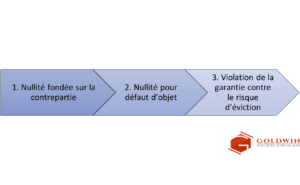
Transfer of a business without transfer of customers – What to do?
Transfer of a business without transmission of clientele – What to do?
You have just bought a business and you notice that the seller has not transmitted his clientele nor the professional telephone list attached to the business.
Despite the full payment of the transfer price, the transferee continues to carry on the business as if nothing had happened?
You must act!
First, you must make sure that your property can be qualified as a business.
Then, you can take action for failure to transfer the business on three legal grounds.
What is a goodwill in French law?
Craft activities are civil activities, carried out by an operator (the craftsman) subject to the unique regime of the individual entrepreneur.
A craftsman is one who derives most of his professional income from his manual work.

The transfer of a craft business (known as the transfer of a craft business) is not subject to any special provisions. Consequently, the provisions of the Commercial Code relating to the sale of a business are excluded (Cass. com. 29-10-1963, D. 1964.51: exemption from the requirement to advertise).
-
Requalification de fonds artisanal en fonds de commerce
Néanmoins, il est prudent de se conformer aux formalités de la cession de fonds de commerce pour pallier toute éventualité de requalification du fonds artisanal en fonds de commerce.
En effet, la jurisprudence emploie deux critères pour distinguer un artisan d’un commerçant (Cass. com., 21 mai 1985 : Bull. civ. IV, n° 16) :
- l’importance du nombre de salariés, et
- la part des revenus professionnels tirés de son travail manuel.
Ainsi, un chauffeur de taxi exploitant une seule voiture lui appartenant a la qualité d’artisan.

However, the cab business becomes commercial if the company has more than ten employees.
In this case, the transfer of the cab business will be subject to the legal regime for the transfer of a business.
Consequently, you can claim that the legal regime for the transfer of a business has been violated if one of the rules provided for in this title is violated.
-
How to act when faced with a transfer of a business without customers?
The cab business is composed of the following elements :
- a clientele, without which the
- a vehicle,
- special equipment, and
- a parking permit.
If you are the transferee, you have three possibilities to act against your transferor in case of transfer of a business without a clientele, namely:

-
The action for nullity on the basis of the consideration
Let’s distinguish two arguments that can be used to support this claim:
| Argument n° 1
Failure to mention the clientele in the deed of transfer (lack of consideration)
|
Argument No. 2
Transfer of the administrative parking permit without customers (illusory consideration)
|
|
The lack of consideration corresponds to the hypothesis in which the seller undertakes to transfer the ownership of a thing that does not exist.
On the basis of article 1168 of the Civil Code, the case law assimilates the imbalance between the services of the parties to a lack of consideration.
In this case, the disputed contract cannot be qualified as a transfer of a cab business, but would be a simple transfer of an administrative parking permit devoid of any meaning.
Consequently, you can act to have the transfer nullified for lack of clientele stipulated in the deed.
|
Case law deduces from article 1169 of the Civil Code that the parties must agree on a real consideration at the time of the formation of the contract (Cass. civ. 1e, July 3, 1996, decision known as “Point club vidéo”).
In the contract of sale, the delivery of the thing is the counterpart of the payment of a not derisory price, and vice versa.
However, if your assignor transfers to you the administrative authorization to park without transferring to you his clientele or the professional telephone line attached to the business, you can oppose him the lack of real consideration to have the contract cancelled.
|
-
The action in nullity of the sale for lack of object
Article 1583 of the Civil Code in the French Law states that the essential elements of a contract of sale are the thing and the price.

Thus, the sale is only possible under two conditions:
- The thing exists (in the sense of article 1601 of the Civil Code), and
- The thing is identified, in the sense that the performance which is the object of the obligation must be possible and determined or determinable (article 1163 of the Civil Code).
Failing this, the contract is void for lack of subject matter (Cass. civ. 3e, Jan. 24, 2019, no. 17-25.793).
The case law pronounces the nullity for lack of purpose of a transfer of shares of a company resulting from their disappearance by the effect of a merger by absorption (Cass. com., May 26, 2009, n° 08-12.691).
-
The claim for restitution of the transfer price and damages for breach of the warranty against the risk of eviction
- What is the warranty against the risk of eviction?
The warranty against the risk of eviction is a commitment made by the assignor to ensure that the assignee has peaceful possession of the thing assigned after its delivery (article 1628 of the Civil Code).

In this respect, the assignor undertakes to :
- to refrain from infringing upon the peaceful possession of the buyer (eviction by personal act), and
- to guarantee the transferee against disturbances from third parties (eviction by third parties).
- What are the sanctions?
Article 1630 of the French Civil Code provides for four cumulative penalties for breach of the warranty against the risk of eviction:
1° restitution of the price ;
2° restitution of the fruits, when he is obliged to return them to the owner who evicts him;
3° the costs incurred on the buyer’s claim for security, and those incurred by the original claimant;
(4) finally, damages, costs and fair costs of the contract.
For more information on the application of the law to your case, you can contact our team of lawyers, who will draw up a strategy adapted to your situation.




